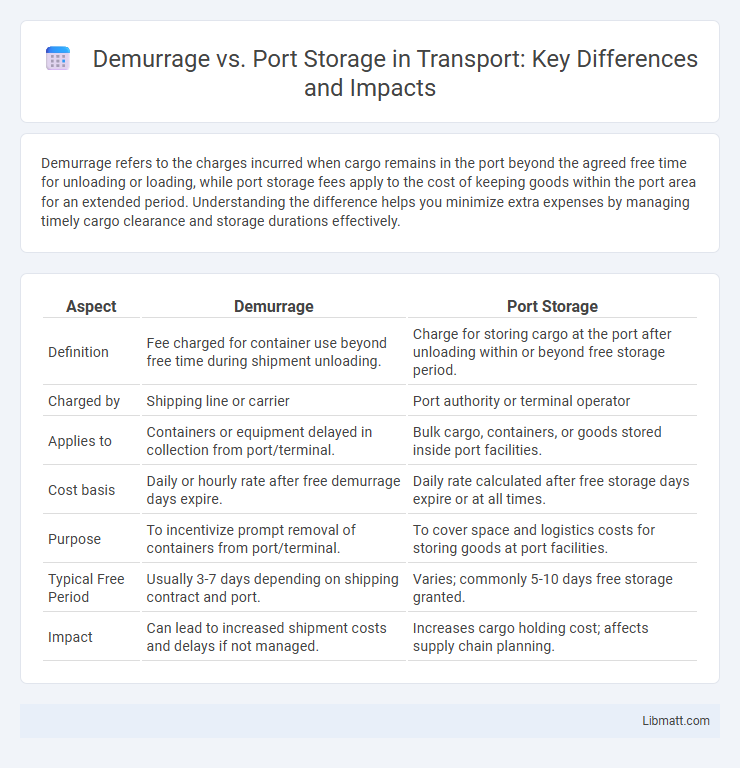Demurrage refers to the charges incurred when cargo remains in the port beyond the agreed free time for unloading or loading, while port storage fees apply to the cost of keeping goods within the port area for an extended period. Understanding the difference helps you minimize extra expenses by managing timely cargo clearance and storage durations effectively.
Table of Comparison
| Aspect | Demurrage | Port Storage |
|---|---|---|
| Definition | Fee charged for container use beyond free time during shipment unloading. | Charge for storing cargo at the port after unloading within or beyond free storage period. |
| Charged by | Shipping line or carrier | Port authority or terminal operator |
| Applies to | Containers or equipment delayed in collection from port/terminal. | Bulk cargo, containers, or goods stored inside port facilities. |
| Cost basis | Daily or hourly rate after free demurrage days expire. | Daily rate calculated after free storage days expire or at all times. |
| Purpose | To incentivize prompt removal of containers from port/terminal. | To cover space and logistics costs for storing goods at port facilities. |
| Typical Free Period | Usually 3-7 days depending on shipping contract and port. | Varies; commonly 5-10 days free storage granted. |
| Impact | Can lead to increased shipment costs and delays if not managed. | Increases cargo holding cost; affects supply chain planning. |
Introduction: Understanding Demurrage and Port Storage
Demurrage refers to the fees charged by shipping lines when cargo remains at the port beyond the allowed free time for unloading. Port storage involves costs incurred for keeping goods within the port facilities, typically after demurrage charges apply, reflecting extended warehousing needs. Differentiating demurrage from port storage is crucial for managing supply chain expenses and optimizing cargo flow.
Key Definitions: Demurrage vs Port Storage
Demurrage refers to charges incurred when cargo remains at a port or terminal beyond the agreed free time for unloading or loading, emphasizing the cost of delayed vessel turnaround. Port storage fees apply to goods stored within port facilities after the free storage period, highlighting costs associated with warehousing cargo on-site. Both demurrage and port storage impact logistics expenses but differ in scope: demurrage targets vessel-related delays, while port storage focuses on cargo holding durations.
How Demurrage Works in Shipping
Demurrage in shipping refers to the charges incurred when cargo remains at the port beyond the agreed free time for unloading or loading. These fees compensate the shipping line for the extended use of their container or vessel space, encouraging timely cargo clearance. Understanding demurrage can help you avoid unnecessary costs by ensuring your shipments are picked up within the allowed timeframe.
The Role of Port Storage Fees
Port storage fees cover the cost of holding cargo within the port's facilities after unloading, typically calculated on a daily basis based on the storage area used. These fees incentivize timely cargo clearance to prevent congestion and ensure efficient port operations. Understanding port storage charges helps you manage overall logistics expenses by distinguishing them from demurrage, which applies to delays in container return beyond the free time.
Main Differences Between Demurrage and Port Storage
Demurrage refers to the fees charged for the delayed use of shipping containers or cargo beyond the agreed free time, while port storage involves charges for goods kept in the port's warehouse or container yard after the free storage period expires. Demurrage primarily applies to the use of shipping equipment, affecting your transportation costs directly, whereas port storage fees are linked to the physical space occupied by your cargo within the port premises. Understanding the distinction helps optimize logistics expenses by managing container return times and storage durations efficiently.
Impact of Demurrage on Supply Chain Efficiency
Demurrage charges significantly impact supply chain efficiency by increasing overall transportation costs and causing delays in cargo release. Excessive demurrage can lead to congestion at ports, disrupting scheduled shipments and reducing the velocity of inventory turnover. Efficient management of demurrage through optimized container handling and timely documentation accelerates cargo flow and minimizes supply chain disruptions.
How Port Storage Affects Logistics Costs
Port storage directly impacts logistics costs by increasing the expense of holding containers at the terminal beyond the free storage period, leading to higher charges compared to demurrage fees which apply when containers are still on the vessel. Extended port storage can cause congestion, delay cargo release, and disrupt supply chain schedules, amplifying overall transportation and inventory carrying costs. Efficient management of your container flow minimizes port storage fees and optimizes logistics expenditures.
Strategies to Avoid Demurrage and Port Storage Charges
Implementing efficient cargo release and clearance processes significantly reduces demurrage and port storage charges by minimizing vessel idle time and container dwell duration. Utilizing real-time tracking systems and coordinating closely with customs and shipping lines accelerates document processing and container pickup. Negotiating flexible free time extensions and consolidating shipments further optimize storage periods and limit additional fees.
Case Studies: Common Scenarios and Solutions
Case studies illustrate demurrage often arises when cargo remains on the vessel beyond the free time, incurring daily charges, while port storage fees apply once cargo is unloaded but remains within port facilities. Common scenarios include delays caused by customs clearance or insufficient trucking capacity, leading to parallel demurrage and storage costs. Solutions typically involve streamlined documentation processes, enhanced coordination between shipping lines and port authorities, and predictive logistics to minimize idle time and expenses.
Conclusion: Choosing Cost-Effective Port Operations
Demurrage charges apply when cargo exceeds the free time allowed for unloading, while port storage fees are incurred for goods stored within the port for extended periods. Your choice between managing demurrage or port storage depends on how effectively you coordinate cargo movement and minimize delays. Optimizing these factors leads to cost-effective port operations and improved supply chain efficiency.
demurrage vs port storage Infographic

 libmatt.com
libmatt.com